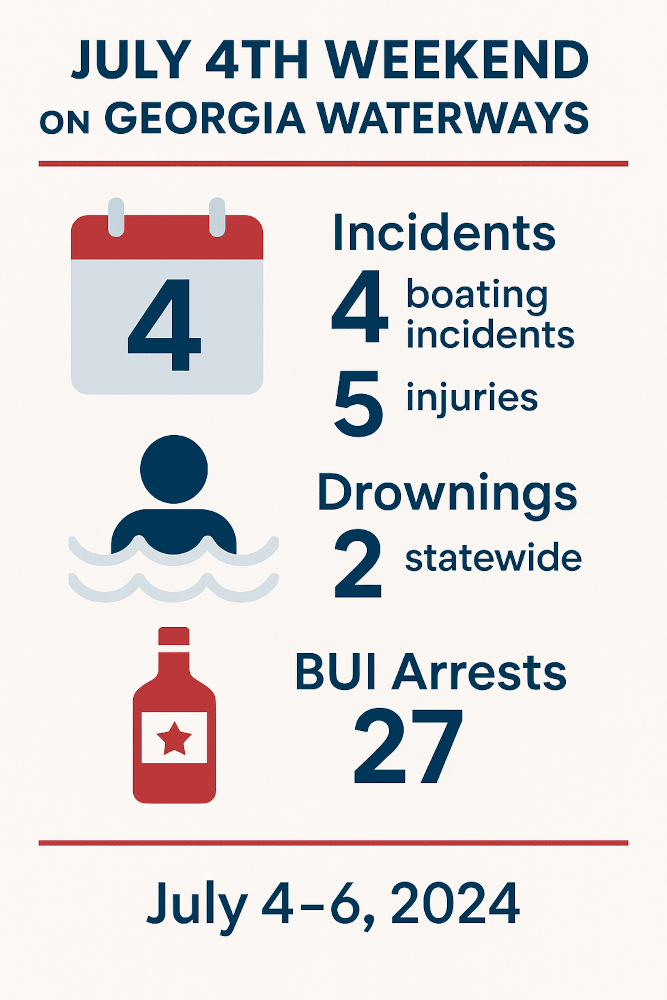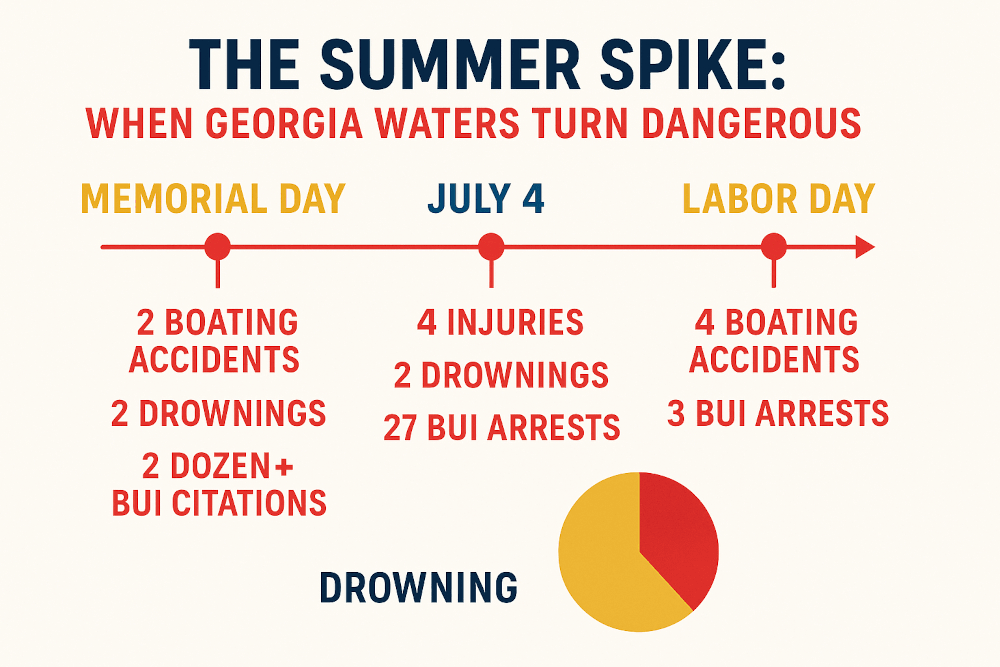Boating In Georgia Is A Fun And Popular Pursuit, But It Can Also Be An Incredibly Dangerous Injury And Fatality Risk. Here’s Why.
What better way to spend a summer afternoon than boating on a tranquil Georgian waterway? And yet, boating in Georgia has never been more dangerous than it is today, with injuries, boating under the influence (BUI) incidents, and even drowning deaths all at or approaching record levels – a far cry from the snail-paced summer boating stereotype.
This study considers the stark details behind the numbers to reveal why so many boaters are injured and killed, what types of incidents happen, when most of these incidents occur, plus other related factors. And we recommend some potential measures that would make Georgia waterways a safer summer option.
Georgia: Boating Fatalities, Injuries, And Misdemeanors
Study data tells us that, in 2024, Georgia suffered 20 boating-related fatalities, 57 boating-related drownings, and 259 BUI arrests. As a comparison, just 10 people died in Georgian boating incidents in 2020.
By mid-May of this year (2025), the state had already recorded 27 drownings and five boating fatalities, with a potentially record-breaking year for boating calamities in store. And in terms of accident-prone boating spots in Georgia, Lake Lanier is at the top of the list.
Lake Lanier – Georgia’s Deadliest Boating Spot
Lake Lanier – a man-made reservoir created by the Buford Dam on the Chattahoochee River, and about an hour’s drive north of Atlanta – is an infamous Georgian boating site.
With over 700 drownings during the past 70 years (10 drownings every year), Lanier fatalities represent a figure far above the national drowning average for inland lakes.
Because it’s the site of so many boating tragedies, Lake Lanier continues to be a central focus for boating safety reform and intensified law enforcement patrols, especially during the summer.

Holiday Weekends Are High-Risk Windows – Especially During The Summer
For example, two separate jet ski accidents at Lake Lanier on July 4, 2023, resulted in four people being hospitalized with multiple fractures and lacerations.
By Labor Day (4 September) that year, eight people had drowned in Lake Lanier; in Georgia as a whole, there were 39 drownings across 94 boating accidents involving 121 BUI cases.
By the end of 2023, there had been 275 BUI cases reported in Georgia. During the 2024 July 4-6 weekend, two people drowned in the state: a 16-year-old at Tybee Island and a 39-year-old at Lake Rabun.
A further four suffered injuries, and there were 27 BUI cases reported – 15 on Lake Lanier. And such high numbers at such a popular tourist location raise questions for tourism officials, lakefront business owners, and city planners: simply put, the stigma that boating accidents and misdemeanor notoriety breed threatens to damage the local economy.

Ultimately, summertime is the key period in Georgia for boating deaths, injuries, and misdemeanors. And the situation is getting worse. One telling piece of study data clearly emphasizes the fact: Georgia’s Department of Natural Resources (DNR) made 30 BUI arrests on Memorial Day in 2021.
By 2023, the number of arrests on the same day was 40. With study data also telling us that up to 80% of all boating accidents across the U.S. involve alcohol or drugs, the signs are worrying.
Life Jacket Laws Don’t Go Far Enough
The number of people who don’t wear a life jacket while boating is another worry. It’s a simple fact: the vast majority of people who drown while boating would still be alive had they been wearing one.
DNR data reveals that 87% of U.S. drowning victims die without a life jacket. And yet, in Georgia, adults are not obliged to wear one, and only do so due to personal choice. As things stand, only those under the age of 13 must wear a life jacket. Clearly, the mandatory wearing of a life jacket for all people out on a boat in the U.S. would prevent countless deaths every year.
Georgia’s dangerous boating problem is also starting earlier in the year, with drownings and other accidents spiking much earlier in the boating season.
Reliable study data projects that 2025 will likely be a record year for injuries and fatalities. And in each case where someone suffers an injury while on a boat, there’s no guarantee that they’ll be covered by their insurance.
Injured While Boating In Georgia: But Are You Covered?
It’s definitely unwise for any Georgia resident to assume that they’ll be able to claim financial restitution following a boating injury, since homeowner and auto policies usually exclude boating coverage.
More worryingly, dedicated marine insurance may well deny an injury claim, even if there’s an associated BUI charge or operator inexperience has been established. Such claim rejections often leave boating accident victims with high medical bills and no means of help. A better understanding of this factor would enable far more boaters to check in advance if they’re covered, and exercise sufficient caution if they’re not.
What Needs To Change To Save Lives
The wider perception of boating – nationally, and across Georgia – needs to quickly evolve. It’s certainly not just a placid, low-risk leisure activity: it’s also a high-risk environment where safety rules are often ignored, with increasingly tragic consequences. 2023 U.S. Coast Guard data tells us that 564 people died nationally while boating – an incredible figure for a leisure pursuit that’s meant to feature idyllic hours on the water.
Many simple measures, observed in significant numbers, could save hundreds of lives. Tighter regulations around who can commandeer a boat would surely help, with operator error listed as the number one cause of boating accidents.
Currently, Georgia law dictates that anyone born on or after January 1, 1998, must complete a DNR-approved boating education course before they can operate a motorized boat. It might be worth applying the same law to all motorized boaters, especially child passengers, who currently receive no formal training.
With youth drownings on the rise (including the previously mentioned 16-year-old at Tybee Island), it’s probably a good idea to instill good habits early, with schools a potentially crucial help. States such as Florida have already piloted high school water safety classes to help curb teen fatalities.
Additionally, a bigger deterrent against drinking or drugging while out on the water is probably needed to curb hundreds of annual BUI cases. Under current law, a BUI offense can incur a fine of up to $1,000 and/or up to 1 year in jail, and deaths on the water due to BUI far too often fail to result in severe punishment. Harsher penalties may now be necessary.
Other measures that would help include making a properly designated lookout mandatory during each boating journey, more rigorous and punitive enforcement around speeding on waterways, and more punishment for boat owners if their vehicles suffer a potentially dangerous and avoidable mechanical issue while out on the water.
There’s also a critical wider need for better public awareness campaigns about the dangers of boating. And let’s not forget the influence of social media apps like TikTok and Instagram: those resources regularly feature viral ‘Lake Day’ trends, many of which encourage the use of alcohol on boats, high-speed boating, and risky stunts on Georgia lakes.
Study data suggests that such content normalizes waterway danger and negatively influences teen boaters. Better policing of such content, and a full appreciation of the pervasive power of such an influential source of dangerous inspiration, is well overdue.
Ultimately, the simplest, best single way to save lives would surely be to make life jackets mandatory for all boating journeys. Col. Mike England from Georgia DNR’s Law Enforcement Division agrees, and suggests: “If you’re not a good swimmer, it’s okay to wear a life jacket all day long. You can still get a sun tan wearing a life jacket.”
At Jones & Swanson, we’re personal injury experts who can help you with your claim if you’ve been injured while out boating. Our experienced attorneys know exactly what evidence to collect and how to build a meticulous, air-tight case to prove who was at fault. Get in touch today for more information.






